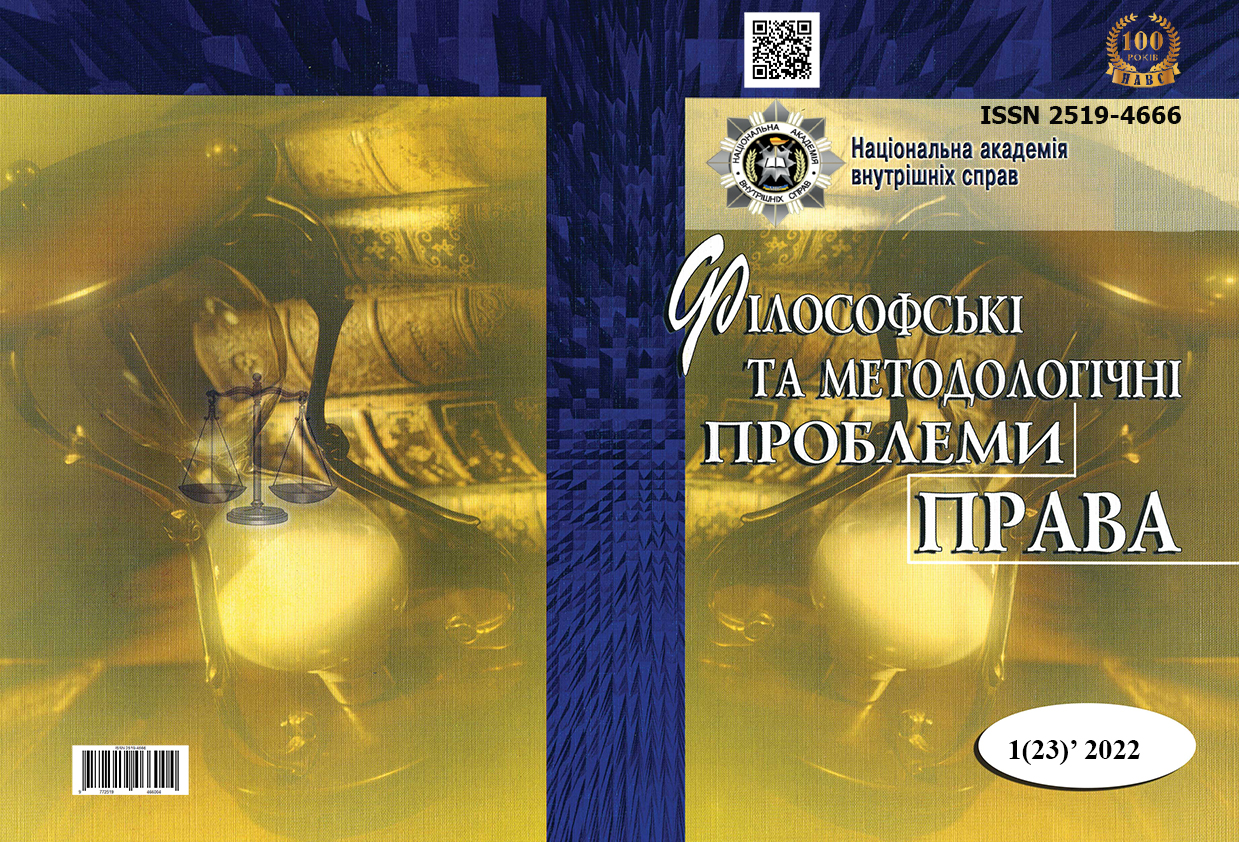"Roman Impression" in the Formation of Legisprudence
Abstract
The purpose of the Article is to study the origins of the European tradition of studying the law-making process – Legisprudence based on the analysis of the creating law processes in Ancient Rome and on the basis of the worldview of Quirites. Such study became possible thanks to the textual analysis of the legal texts of Roman lawyers and the latest research in the field of lawmaking. Methodology. In the process of preparing the article, a sociocultural methodological approach and a number of scientific methods were applied, the most important of which are: generalization, comparative legal, hermeneutic methods. Such a set of methodological tools ensured the integrity of the study of understanding the role of the ancient Romans in determining an independent theoretical direction in the study of the legislative process. The scientific novelty lies in the fact that the article reflects the origins of legisprudence as a theoretical trend that took place in the context of the worldview and ideological guidelines of the Quirites culture. The specificity of the ancient Roman understanding of laws and the main characteristic features of the legislative process in Rome are pointed out. Conclusions. It is shown that legisprudence as a direction of ancient Roman jurisprudence was associated with the main worldview instructions of the ancient Roman society and was due to the search for ways to create effective laws.
Keywords: law; legisprudence; rulemaking; law-making process; lawmaking.
Downloads
References
Сліденко І. Оновлення правової системи України в контексті доктрини легіспруденції. Вісник Конституційного Суду України. 2014. № 6. С. 70–81.
Шулмане Д., Шевчук П. Легиспруденция – новый подход к вопросу о законотворчестве. URL: https://www.academia.edu/6459132/%D0).
Погорєлова З. О. Проблеми удосконалення законотворчої діяльності. Вісник УЖНУ. 2021. № 68. С. 25–29. DOI: https://doi.org/10.24144/2307-3322.2021.68.4.
Погорєлова З. О. Законодавча влада як легітимна основа законотворчої діяльності. Вісник УЖНУ. 2021. № 66. С. 19–26. DOI: https://doi.org/10.24144/2307-3322.2021.66.3.
Legisprudence: A New Theoretical Approach to Legislation. Oxford ; Portland,OR : Hart Publishing, 2002. 160 р.
Антонов М. В., Поляков А. В., Максимов С. И. Различие и единство во взаимодействии правовых культур в ХХI веке (XXIII Всемирный конгресс Международной ассоциации философии права и социальной философии). URL: http://dspace.nbuv.gov.ua/handle/123456789/13620.
Демидова И. А. Нормотворчество и нормография: к вопросу соотношения в контексте закона Республики Беларусь «О нормативных правовых актах». Веснік Магілёўскага дзяржаўнага ўніверсітэта імя А. А. Куляшова. 2020. № 1 (55). С. 110–114.
Сaнфилиппо Ч. Курс римского частного права : учебник. М. : Норма. 2011. 464 с.
Оксамытный В. В. Законотворческий процесс: сравнительно-правовой анализ. URL: https://cyberleninka.ru/article/n/zakonotvorcheskiy-protsess-sravnitelno-pravovoy-analiz.
Delz G. Der griechische Einfluss auf die Zwölftafelgesetzgeburg. Museum Helveticum. 1966. Vol. 23. No 2. P. 69–83.
Вовк В. М. Приватно-правова технологія древніх римлян як конструювання правової реальності. Адвокат. 2009. № 2. С. 22–26.
Abstract views: 159 PDF Downloads: 149
Copyright (c) 2022 Philosophical and Methodological Problems of Law

This work is licensed under a Creative Commons Attribution-NonCommercial-NoDerivatives 4.0 International License.
- Authors reserve the right to authorship of their own work and transfer to the magazine the right of the first publication of this work under the terms of the Creative Commons Attribution License, which allows other persons to freely distribute published work with mandatory reference to authors of the original work and the first publication of an article in this magazine.
- Authors have the right to enter into separate additional agreements on non-exclusive dissemination of the work in the form in which it was published in the journal (for example, to post an article in the institution's repository or to publish as part of a monograph), provided that the link to the first publication of the work in this journal is maintained.
- The journal's policy allows and encourages the posting of articles by authors on the Internet (for example, in electronic storehouses of institutions or on personal websites), both before the submission of this manuscript to the editorial office and during its editorial processing, as this contributes to the creation of a productive scientific discussion and positively affects the efficiency and dynamics of citing the published work.




